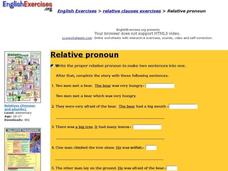Curated OER
English Exercises: Relative Pronouns
In this online, interactive worksheet, emerging grammarians respond to seven fill in the blank questions that require them to use relative pronouns. After completing the exercise, they can submit their answers for immediate feedback!
Curated OER
Using a Computer to Write a Letter: Verbs (Sequencing)
Review sequencing by providing your English language learners with this mix of sentences. Cut the paper into 20 strips, and have each learner rearrange them into the correct order. Don't forget to keep one copy with the correct order!
Curated OER
Using a Computer to Write a Letter: Nouns
Test your English language learners' ability to find the correct nouns! They will complete the blanks for 20 sentences that detail how to use a computer to write a letter. A word bank is included at the top of the page.
Curated OER
Using a Computer to Write a Letter: Verbs
Review the procedure of using a word processor to write a letter. Writers read 20 sentences that are each missing one action verb. They use the words in the word bank to complete the sentences.
Curated OER
Subject-Verb Agreement
Subject-verb agreement takes practice to master; give your learners a chance to put their skills to the test using these 10 sentences. They choose the correct verb from two options for each sentence. Encourage subject recognition and not...
Curated OER
Language Arts Jeopardy
Review parts of speech, verb tense, The Giver by Lowis Lowery, the mechanics of writing, and vocabulary. This Jeopardy-style game is perfect for any 4th or 5th grade class having read the book The Giver and in need of language arts...
Curated OER
Capitalization in Sentences
Woah, these sentences need some capitals! Learners examine 10 incorrect sentences to determine which letters should be capitalized. They circle names, restaurants, sentence-starters, titles, planets, days of the week, locations, and...
Curated OER
Nouns
Give your young grammarians practice with nouns. With this five-question activity, they read the sentence, select the noun to the right that completes the sentence the best, and write the word in the blank.
Curated OER
Describe Yourself!
Who are you? Where are you from? Teach young Spanish language learners how to identify themselves and where they're from. They draw a picture of themselves to help develop vocabulary for this activity.
Curated OER
Describing People
With a variety of pictures, fourth grade Spanish language learners will review adjectives by describing the appearance of the people in the pictures. You will need to bring in the pictures, and consider creating a word bank of adjectives...
Curated OER
Describing the Planets
Young Spanish language learners review the names of each planet. Then, in pairs, they work to complete the chart provided. What is the composition of each planet? What is the color? They learn how to describe the planets.
Curated OER
What's the Case? - The Three Cases of a Personal Pronoun
In this grammar worksheet, students learn about personal pronouns (subject, object and possessive) in sentence writing. They then answer the 14 questions on the worksheet. The answers are on the last page of the packet.
Curated OER
Present Perfect Tense Practice
Intended simply for practice, this set of ten sentence frames requires a verb conjugation for each. In this case, all verbs must be translated to the present perfect tense. The sentences, although nothing exciting, are simple and provide...
Curated OER
Plural or Singular
Review how different words can be plural or singular. Presented are four different endings that indicate the plural form of a noun. Double e, -ies, -evs, and adding s are all covered. There are no rules just examples for each.
Curated OER
Adding -s/-es to Verbs Ending in -y
Explore irregular verbs by practicing the rule for adding -s/-es to verbs that end in -y. There are 15 sentences provided to practice changing words like play, study, try, and buy.
Curated OER
Parts of Speech: Adjectives
What is an adjective? Read the informational paragraphs before having your elementary learners take the 10-question quiz. Learners distinguish between a group of words to find the adjective. Possessive adjectives and plural adjectives...
Curated OER
Gender of Nouns
Either enlarge these slides to present to your learners on the screen, or print them for each individual. They provide a review of noun gender and definite/indefinite articles. There is a place for learners to practice on each slide.
Curated OER
Wall Reading
Pupils are given practice in scan reading and in revising verb forms. They are given copies of Worksheet 2. Students are told that they should answer all the questions on the Worksheet and that it is a 'race.' They use thier short-term...
Curated OER
The Beatles and The Rolling Stones
Young scholars exchange information orally about The Beatles and The Rolling Stones during the 1960s until 1970. They work in pairs to complete a gap-fill activity from memory. Students play hangman at the beginning of the lesson.
Curated OER
Words You Know
In this words you know worksheet, 7th graders write words in English for foods, drinks, travel, transportation, computer, sports and verbs.
Curated OER
Articulos indefinidos
Your young Spanish learners identify the correct indefinite article for each of nine listed nouns. Consider also having them draw two or three of the nouns, rewriting the word next to each picture.
Curated OER
Jabberwocky-Identifying Adjectives
Elementary learners identify adjectives in sentences. They read the poem "Jabberwocky" by Lewis Carroll and highlight the adjectives. A good supplemental lesson if you are studying Lewis Carroll and/or "Jabberwocky."
Curated OER
Parts of Speech 2
Prepositions, verb, and interjections! Have your class take this online quiz and see how well they know the parts of speech. There are 9 parts of speech to identify.
Curated OER
Pronoun-Antecedent Agreement Made Easy
Middle and high schoolers check their writing for pronoun-antecedent agreement. After identifying the pronouns in their writing, they then complete a table with the pronouns and corresponding antecedents, making revisions as necessary.

























